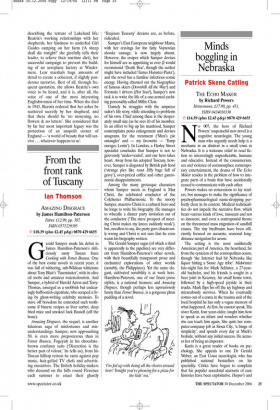From the front rank of Tuscany
Ian Thomson
AMAZING DISGRACE by James Hamilton-Paterson Faber, £12.99, pp. 307, ISBN 0571229395 ✆ £10.39 (plus £2.45 p&p) 0870 429 6655 Gerald Samper made his debut in James Hamilton-Paterson’s deliciously nasty Tuscan farce Cooking with Fernet Branca. One of the best comic novels in recent years, it was full of withering, sub-Wildean witticisms about Tony Blair’s ‘Tuscminster’, with its olive oil snobs and amateur watercolourists. And Samper, a hybrid of Harold Acton and TerryThomas, emerged as a snobbish but endearingly buffoonish expatriate, who scraped a living by ghost-writing celebrity memoirs. To stave off boredom he concocted such toothsome if bizarre recipes as liver sorbet, deep fried mice and smoked Jack Russell (off the bone).
Amazing Disgrace, the sequel, is another hilarious saga of misfortunes and misunderstandings. Samper, now approaching 50, is even more preposterous than in Fernet Branca. Fogeyish in his chocolatebrown corduroy suits (‘Discretion is the better part of velour,’ he tells us), from his Tuscan hilltop retreat he rants against pop music, hair-gelled TV chefs and advertising executives. The British holiday-makers who descend on the hills round Florence each summer to enact their ghastly ‘Toujours Tuscany’ dreams are, as before, ridiculed.
Samper’s East European neighbour Marta, with her cravings for the fatty Voynovian shonka sausage, is now largely absent. However, the recipes which Samper devises for himself are as appetising as ever (I would recommend ‘Death Roe’, though the author might have included ‘James Hamster-Pasta’), and the novel has a familiar infectious comic energy. Having churned out the biographies of famous skiers (Downhill All the Way!) and Formula 1 drivers (Hot Seat!), Samper’s new task is to write the life of a one-armed yachting personality called Millie Cleat.
Gamely he struggles with the amputee sailor’s life story, while attending to problems of his own. Chief among these is the desperately small size (as he sees it) of his member. In an effort to big up his manhood, Samper contemplates penis enlargement and devises anagrams for the treatment (‘Men’s pie entangler’ and — my favourite — ‘Temp enrages Lenin’). In London, a Harley Street specialist concludes that Samper is not so grievously ‘under-vealed’, and our hero takes heart. Away from his adopted Tuscany, however, Samper is disgusted by British pub food (‘strange pies like roast Jiffy bags full of gravy’), over-priced coffee and other gastronomic disappointments.
Among the many grotesque characters whom Samper meets in England is Max Christ, the celebrated conductor of the Colchester Philharmonic. To the snooty Samper, maestro Christ is a cultural hero and he longs to write his biography. He manages to wheedle a dinner party invitation out of the conductor (‘The mere prospect of meeting Christ makes my knees suddenly weak’), but, needless to say, the party goes disastrously wrong and Christ is not sure that he even wants his biography written.
The Gerald Samper sagas (of which a third is apparently in the pipeline) are very different from Hamilton-Paterson’s other novels, with their beautifully transparent prose and enchanted explorations of other worlds (notably, the Philippines). Yet the same elegant, cultivated sensibility is at work here. Hamilton-Paterson, one of our finest prose stylists, is a national treasure; and Amazing Disgrace, though perhaps less uproariously funny than Fernet Branca, is a gorgeous plum pudding of a novel.




































 Previous page
Previous page